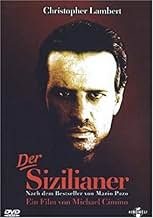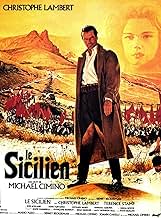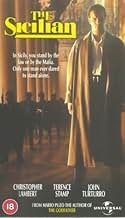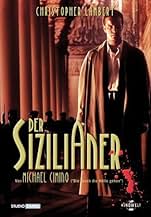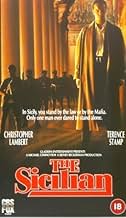CALIFICACIÓN DE IMDb
5.4/10
5.7 k
TU CALIFICACIÓN
El bandido egocéntrico Salvatore Giuliano lucha contra la Iglesia, la mafia y la nobleza terrateniente mientras lidera un movimiento populista por la independencia de Sicilia.El bandido egocéntrico Salvatore Giuliano lucha contra la Iglesia, la mafia y la nobleza terrateniente mientras lidera un movimiento populista por la independencia de Sicilia.El bandido egocéntrico Salvatore Giuliano lucha contra la Iglesia, la mafia y la nobleza terrateniente mientras lidera un movimiento populista por la independencia de Sicilia.
- Dirección
- Guionistas
- Elenco
- Dirección
- Guionistas
- Todo el elenco y el equipo
- Producción, taquilla y más en IMDbPro
Opiniones destacadas
One of the underlying problems with Michael Cimino's film is that it makes the remarkable Sicilian countryside do too much of the narrative work. If you were to watch the film with the sound turned off -- saving you from the stilted dialogue and the gushy score -- you might think much better of the whole enterprise, so powerful is the photography of those rugged mountains and steep canyons. But everything is so visually splendid that it undermines any sense that the poor are actually suffering and starving out there. A travelogue does not always make for good storytelling. And, of course, the pan-and-scan version, the only one currently available on DVD, chops out most of the landscape, limiting the impact of the movie's visual achievement.
Another problem for Cimino's film is that there's actually a much better version of the same story from an earlier director. Few people seem to be aware of the earlier treatment. In 1962, the great Italian director Francesco Rosi released his superb version under the title "Salvatore Giuliano." It's in black and white, but gloriously so. The massacre of the peasants in Rosi's version is one of the most heartbreaking and dramatically memorable sequences in the history of Italian film. And throughout, the dark ambiguity of the main character remains consistently compelling, within a far more complex storytelling mode than Cimino's surprisingly straightforward Hollywood-inflected retelling. The Rosi film deserves to be much better known.
Another problem for Cimino's film is that there's actually a much better version of the same story from an earlier director. Few people seem to be aware of the earlier treatment. In 1962, the great Italian director Francesco Rosi released his superb version under the title "Salvatore Giuliano." It's in black and white, but gloriously so. The massacre of the peasants in Rosi's version is one of the most heartbreaking and dramatically memorable sequences in the history of Italian film. And throughout, the dark ambiguity of the main character remains consistently compelling, within a far more complex storytelling mode than Cimino's surprisingly straightforward Hollywood-inflected retelling. The Rosi film deserves to be much better known.
Cimino is one of the very rare species on earth that can create a "MOOD' that leads to the very cradle of western civilization. The Roman Empire. As a foreigner who has lived in an Italian town for a year, I come to see that the colossal heart of every Italian man can only be captured with its gist by Cimino. And no other up till date. It comes from lighting, its shadow, its colours, its smell even on screen, its silhouettes, its accents, its breathing space, and his very own colossal heart that can contain it all. You do feel that he has achieved that sacred task in showing us THE SICILIAN. Nobody has that feeling ever been captured with rapture that its texture is almost noble, royal, yet sacred. But in its careful craftsmanship of Cimino, you find it everywhere, and it is just everywhere that overflows: its costumes, its lighting, its camerawork, its juxtaposition, its projections, so on and so forth. Its tempo of the film makes you flow like a river that breeds lives and cultures at the very same time.
I read the novel by Mario Puzo quite a few years ago, but do not remember a thing about it, unlike most other Puzo works that I have consumed. So, maybe the source material was a bit lacking. If I remember correctly, Michael Cimino had already destroyed one studio, and well, I don't know how much was invested in this one, but I hope not too much. Cimino was obviously shooting for the sweeping epic, but ended up hitting soap opera level melodrama. The high points were the scenery, the cinematography, and the score. The low points were the plot and the acting. Christopher Lambert badly needed a charisma injection before trying to play this part. Joss Ackland was adequate as the mafia don, and Terence Stamp as the enigmatic prince, but the rest of the cast, ick. Cannot recommend this one.
"Heaven's Gate" was Michael Cimino's worst film and one of the worst of all time? Never. The troubled making of it was a disaster, indeed, but the movie is almost a masterpiece and a good film on its own. The ones that came after Cimino's "ban" from Hollywood are the excellent "The Year of the Dragon", the average "Desperate Hours", his last "The Sunchaser" (a nice film for those with eyes to see), and this one "The Sicilian", adaptation of Mario Puzo's novel and based on the life of criminal Salvatore Giuliano. In my humble opinion, this is his worst film. Confusing, ineffective and trapped in a weird chaotic fashion with scenes going from good to painfully bad. But it's better to blame on Steve Shagan's script and the studio who trimmed down the film in a few minutes making the story even more confusing than what already is.
What we gather is that Giuliano (played by a dreadful Christopher Lambert) and his Sicilian group of criminal peasants cause horror in Sicily stealing land from its rich owners and giving to the poor, working for the cause of making Sicily independent. He defied politics, the church and everyone against his actions. His popularity was so great that even a powerful mafioso (like the one played by Joss Ackland) gave him some support until the day his arrogance for more power drives him off course, and no one's there to help him anymore. I guess this film could be called "Salvatore Giuliano: The Beginning" as it ends from the part where Francesco Rosi's good classic begins with the disastrous and controversial investigation about the mysterious robber's murder, a political crime that devastated Italy.
If built on the same tradition of "The Godfather", with substance and greatness it would have turned out to be a great endeavor. However, it all looks phoney, simplistic and we feel as if watching a poor version of "Scarface". Another story about a man trying so hard to be a powerful criminal, difference is that he has some ideals of respect, justice and fights for others though he's no hero - but he seems more reliable than all the other corrupted Italian institutions. And in Giuliano's role, Lambert comes off a stiff, unnatural, only pleasing to look at when he's dressed with his elegant trench-coat. Ruined the movie just as much as Barbara Sukowa as the American lady who "rapes" the gangster.
And there are qualities to be found in this Cimino work, qualities that remind us of his previous works. The cinematography bears similarities with the shots captured in "The Deer Hunter" and "Heaven's Gate" and Vilmos Szigmond is not the director of photography here yet it looks like one of his works; David Mansfield score has its moments; Mr. Ackland was a strong presence, as John Turturro as well, playing Giuliano's best friend. It's the story that is wrong. I couldn't get anything from it, no life, no truth, nothing new.
Worthy of a view? Maybe, out of curiosity. Bear in mind that Cimino lost his mojo with this thing with badly staged scenes (but some horrifying and effective moments as well, demonstrated in the barber's execution in front a whole village after being discovered as a traitor who denounced Giuliano) and no story to work with. The book has to be ten thousands better to get ruined this way. 5/10
What we gather is that Giuliano (played by a dreadful Christopher Lambert) and his Sicilian group of criminal peasants cause horror in Sicily stealing land from its rich owners and giving to the poor, working for the cause of making Sicily independent. He defied politics, the church and everyone against his actions. His popularity was so great that even a powerful mafioso (like the one played by Joss Ackland) gave him some support until the day his arrogance for more power drives him off course, and no one's there to help him anymore. I guess this film could be called "Salvatore Giuliano: The Beginning" as it ends from the part where Francesco Rosi's good classic begins with the disastrous and controversial investigation about the mysterious robber's murder, a political crime that devastated Italy.
If built on the same tradition of "The Godfather", with substance and greatness it would have turned out to be a great endeavor. However, it all looks phoney, simplistic and we feel as if watching a poor version of "Scarface". Another story about a man trying so hard to be a powerful criminal, difference is that he has some ideals of respect, justice and fights for others though he's no hero - but he seems more reliable than all the other corrupted Italian institutions. And in Giuliano's role, Lambert comes off a stiff, unnatural, only pleasing to look at when he's dressed with his elegant trench-coat. Ruined the movie just as much as Barbara Sukowa as the American lady who "rapes" the gangster.
And there are qualities to be found in this Cimino work, qualities that remind us of his previous works. The cinematography bears similarities with the shots captured in "The Deer Hunter" and "Heaven's Gate" and Vilmos Szigmond is not the director of photography here yet it looks like one of his works; David Mansfield score has its moments; Mr. Ackland was a strong presence, as John Turturro as well, playing Giuliano's best friend. It's the story that is wrong. I couldn't get anything from it, no life, no truth, nothing new.
Worthy of a view? Maybe, out of curiosity. Bear in mind that Cimino lost his mojo with this thing with badly staged scenes (but some horrifying and effective moments as well, demonstrated in the barber's execution in front a whole village after being discovered as a traitor who denounced Giuliano) and no story to work with. The book has to be ten thousands better to get ruined this way. 5/10
Cimino has created an epic, this is a very ambitious film, which unfortunately went exactly nowhere. Christopher Lambert plays Giuliano, a Sicilian bandit/revolutionary in post WW2 Sicily. Cimino effectively balances all of the powers that be --the church, the mafia, the nobility-- and presents a complex picture of the forces that were at work. Giuliano was a peasant hero, a kind of Robin Hood, whose heart was right but whose head lacked the smarts or the wisdom and ended up being destroyed. Watching this film, I thought of Visconti's The Leopard, it has the sweep of that earlier film, starring Burt Lancaster. Cimino has been in disfavor since Heaven's Gate, but with the Sicilian, he proves that he knows how to direct a film, even if no one ever sees it. BTW, this is one of the few films produced by the late David Begelman, who unfortunately blew his brains out, since he was in over his head legally and financially in 1995. Rent the Sicilian, it is on DVD.
¿Sabías que…?
- TriviaThe novel is a spin-off of The Godfather (set during Michael's exile in Sicily), however all references to the Corleones are omitted from the film.
- ErroresThe film shows Giuliano trying to stop the massacre at Portella della Ginestre (blamed in the film on Terranova, who was one of the few of Giuliano's band who it's definitely known did NOT fire a single shot on that day). In reality Giuliano always accepted full responsibility for the massacre and expressed no sorrow for the victims.
- Citas
Salvatore Giuliano: You're an American, aren't you?
Camilla, Duchess of Crotone: Yes, and like every other Sicilian you want to go to America and start a pizzaria in Jersey.
- Créditos curiososThe 20th Century Fox logo is in black-and-white.
- Versiones alternativasOriginally released at 115 minutes in the USA. A 146-minutes director's cut is available on video and at least in Europe as a region 2 DVD.
- ConexionesEdited into Lo schermo a tre punte (1995)
- Bandas sonorasDomanda al ciel ... Dio, che nell'alma infondere
from "Don Carlo, Act II"
Written by Giuseppe Verdi
Performed by Enrico Caruso and Antonio Scotti
Selecciones populares
Inicia sesión para calificar y agrega a la lista de videos para obtener recomendaciones personalizadas
- How long is The Sicilian?Con tecnología de Alexa
Detalles
Taquilla
- Presupuesto
- USD 9,000,000 (estimado)
- Total en EE. UU. y Canadá
- USD 5,406,879
- Fin de semana de estreno en EE. UU. y Canadá
- USD 1,720,351
- 25 oct 1987
- Total a nivel mundial
- USD 5,406,879
- Tiempo de ejecución
- 1h 55min(115 min)
- Color
- Relación de aspecto
- 2.35 : 1
Contribuir a esta página
Sugiere una edición o agrega el contenido que falta



